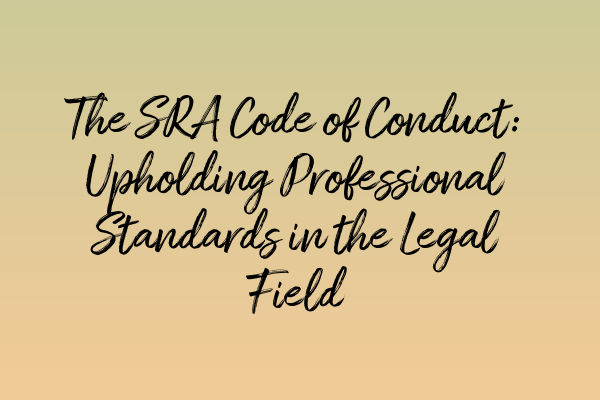Welcome to the Become Solicitor SRA blog! Today, we will be delving into the importance of upholding professional standards in the legal field, specifically through the SRA Code of Conduct. As a solicitor, maintaining these standards is crucial to building and maintaining a reputable practice. Let’s dive in and explore what the SRA Code of Conduct entails and why it matters.
Understanding the SRA Code of Conduct
The Solicitors Regulation Authority (SRA) is responsible for regulating solicitors and law firms in England and Wales. One significant aspect of this regulation is the SRA Code of Conduct, which sets out the ethical and professional standards that solicitors must follow.
The Code is divided into two parts: the Principles and the Outcomes. The Principles outline the ethical principles that solicitors should adhere to, while the Outcomes specify the behaviors and actions required to achieve these principles. The Outcomes act as a roadmap for solicitors in maintaining a high level of professionalism.
Let’s take a closer look at some of the key principles and outcomes outlined in the SRA Code of Conduct:
Integrity
Integrity is one of the fundamental principles emphasized by the SRA. Solicitors are expected to act with honesty and uphold the trust placed in them by their clients and the public. This means being transparent, maintaining confidentiality, and avoiding any conflicts of interest that may compromise the client’s best interests.
Check out our related article on the role of technology in modern legal practice to see how technology can help safeguard confidentiality while upholding integrity.
Competence
Competence lies at the core of providing quality legal services. Solicitors are expected to demonstrate the necessary skill, knowledge, and diligence required to handle their clients’ cases effectively. This means continuously updating legal knowledge, staying abreast of changes in the law, and developing professional expertise.
If you’re interested in learning more about financing your law degree and the options available to you, check out our related article on financing your law degree: understanding costs and options.
Conflict of Interest
Avoiding conflicts of interest is another critical aspect of the SRA Code of Conduct. Solicitors must put their clients’ interests first and foremost, ensuring that their personal, financial, or professional relationships do not compromise their ability to provide objective advice and representation. Full disclosure of any potential conflicts of interest is required.
Curious about prominent law firms in the UK? We’ve got you covered! Check out our related article on a look into prominent law firms in the UK to explore various options and gain insights into the legal industry.
Client Care
Client care is a crucial component of the SRA Code of Conduct. Solicitors must ensure that they act in their clients’ best interests, providing them with clear and accurate advice, information, and documentation. They must also communicate effectively with their clients, keeping them informed about the progress of their case and any relevant updates.
Privacy and Confidentiality
Privacy and confidentiality are integral to maintaining the trust of clients. Solicitors must respect the confidentiality of all client information unless disclosure is required by law or is in the client’s best interests. This includes safeguarding client data and adopting appropriate measures to protect against unauthorized access or disclosure.
For an in-depth understanding of current legal industry trends in the UK, check out our related article on staying ahead: current legal industry trends in the UK. Stay informed and ahead in the dynamic legal landscape.
The Importance of Upholding Professional Standards
Upholding professional standards is essential for solicitors and law firms for several reasons:
- Client Confidence: By adhering to the SRA Code of Conduct, solicitors inspire trust and confidence in their clients. This can lead to stronger client relationships, positive referrals, and enhanced reputation.
- Protection for Clients: The Code of Conduct ensures that solicitors provide the highest level of service and act in the best interests of their clients, protecting them from potential malpractice or professional misconduct.
- Enhanced Reputation: Solicitors who consistently uphold professional standards foster a positive reputation within the legal community and among potential clients. This can lead to increased business opportunities and career growth.
- Regulatory Compliance: Failure to comply with the SRA Code of Conduct can result in disciplinary action, including fines, suspension, or even disqualification. Upholding professional standards is vital to avoid regulatory consequences.
By following the SRA Code of Conduct, solicitors can contribute to a thriving legal profession that serves the needs of clients and upholds the principles of justice and fairness.
In Conclusion
The SRA Code of Conduct provides a framework for solicitors to maintain professionalism, ethics, and high standards in their legal practice. Upholding these standards not only benefits individual solicitors but also strengthens the legal profession as a whole. By understanding the key principles and outcomes of the Code, solicitors can build successful and reputable practices while inspiring trust in their clients.
Thank you for joining us in exploring the importance of upholding professional standards in the legal field. If you have any questions or would like to learn more about becoming a solicitor, please do not hesitate to reach out.


Leave a Reply